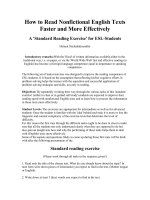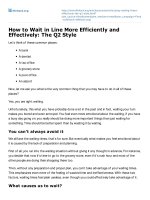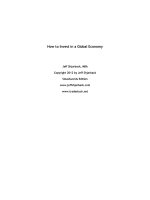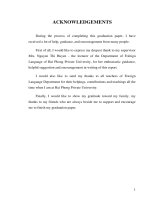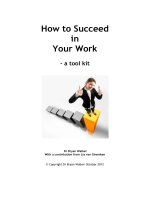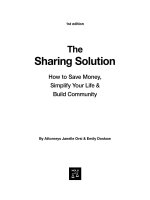How to Wait in Line More Efficiently and Effectively
Bạn đang xem bản rút gọn của tài liệu. Xem và tải ngay bản đầy đủ của tài liệu tại đây (64.57 KB, 5 trang )
lifehack.org
/>effectively-the-q2-style.html?
utm_source=feedburner&utm_medium=email&utm_campaign=Feed
:+LifeHack+(lifehack.org)
How to Wait in Line More Efficiently and
Effectively: The Q2 Style
Let’s think of these common places:
A bank
A dentist
A tax office
A grocery store
A post office
An airport
Now, let me ask you: what is the very common thing that you may have to do in all of these
places?
Yes, you are right: waiting.
Unfortunately, this what you have probably done a lot in the past and in fact, waiting your turn
makes you bored and even annoyed. You feel even more emotional about the waiting, if you have
a busy day going on: you really should be doing more important things than just waiting for
something. Time should be better spent than by wasting it by waiting.
You can’t always avoid it
We all face the waiting times, that’s for sure. But eventually what makes you feel emotional about
it is caused by the lack of preparation and planning.
First of all, you run into the waiting situation without giving it any thought in advance. For instance,
you decide that now it’s time to go to the grocery store, even if it’s rush hour and most of the
other people are doing their shopping there too.
Then, without any preparation and proper plan, you can’t take advantage of your waiting times.
This emphasizes even more of the feeling of wasted time and ineffectiveness. With these two
fact ors, waiting times feel plain useless, even though you could effectively take advantage of it.
What causes us to wait?
When it comes to waiting, there are two components of the issue:
a) Them: The instance where you have to wait is not fully eff ective in its actions
b) You: You enter into the waiting situation without any plans or with wrong attitudes
For instance, in the first scenario, you might have to wait at the post office for your turn. This
could be caused by a lack of personnel who are handling the customers at the post office. The
queues can be also caused by inefficient processes that the instance is currently using and this is
causing unnecessary queues to build up.
In the second scenario, you make the waiting times a worse experience than what they have to be.
In the case of the tax office, the negative feelings are accumulated as long as you have to just sit
(or stand) and wait for your turn. Without any plan, your waiting time feels like an eternity and it
makes you mad that you are losing valuable time like this.
The Q2 thing I was talking about
In the title of this post, I was talking about the waiting in the Q2 style. You may be wondering what
I was talking about.
Well, the Q2 refers to Quadrant 2 and it’s part of the four quadrants that the late Stephen Covey
introduced to the public (the four quadrants was originally created by former US president Dwight
D. Eisenhower).
Covey divided time into four quadrants with the following criteria:
Q1: Urgent – Important
Q2: Not urgent – Important
Q3: Not important – Urgent
Q4: Not important – Not urgent
Out the four quadrants, it’s the Q2 that’s
the most important one. The original
definition defines the Q2 the following
way:
Prevention, PC (production
capability) activities
Relationship building
Recognizing new opportunities
Planning, recreation
As Stephen Covey defined, one of the Q4
activities is time wasters and waiting in
the queue is definitely one of them.
With a little planning, you can take the useless Q4 activity and change it to a beneficial Q2 one and
make the most of the waiting time for your personal advantage.
In specific, I’m talking about the following things:
Studying (reading, listening, watching)
Jotting down ideas
Writing
Learning new things is an investment to your business and to your personal life. And if you ever
wondered when you are going to start reading that interesting book that has been sitting on your
desk for ages, then this is the opportunity you have been waiting for.
Also, waiting times can cause your creativity to spark. When this occurs, be ready to jot down
those great ideas for blog posts or other things you’d like to do in the future. Writing is also a fine
way to spend time while waiting. For instance, when I’m waiting at the airport, I might take my
laptop from backpack and start writing writing posts – whether it’s for my own blog or for others.
Let others be frustrated while you invest in your future
With the following steps, you can take the most out of your waiting times:
1. 1. Find alternate ways. As technology develops, there are going to be new and exciting
possibilities to avoid waiting.
For instance, I shop my train and airline tickets online, do the check-in online (this works for
only select ed airlines for now), do my tax return related things online, pay my bills online.
Nowadays it’s possible to do a lot of stuff through the Internet – rather than standing on the
queue as before.
2. 2. St op following the herd. This is a nice tip that I “re-learned” af ter reading a good time
book by Dan Kennedy: No B.S. Time Management for Entrepreneurs.
He mentioned about not following the herd. In other words, being aware when others are
running errands and taking care of yours outside the rush hours.
With this tip, you can already cut down the waiting frustration a lot.
3. 3. Prepare mentally in advance. If you don’t have any other time to take care of your
errands than during the rush hours, be aware of this in advance. This helps you to be
mentally prepared for the waiting time.
4. 4. Have the right equipment with you. To make the most of my waiting time, I’m carrying at
least these things with me:
Amazon Kindle
A pen
A notebook
A MP3 player
My smartphone
A physical book
If I know that there is going to be a longer waiting time ahead (for example at the airport), I
also carry my laptop with me. In addition, you can also have your tablet computer with you if
you own one. That’s my “mobile waiting toolkit” and it helps me to deal with waiting times
much smoother and without frustrations.
5. 5. Load your equipment wit h right mat erial. I’ll make sure that I have enough mat erial to
cover before I enter the waiting situation. For instance, I download the e-books or drafts of
my blog posts to my laptop or the podcasts or audiobooks to my MP3 player.
There is yet another handy tool that you might know, but I bring it up anyway. If you have an
Amazon Kindle, you can use it with a service called InstaPaper.
InstaPaper lets you to save web pages for later reading and before hitting the road or
running your errands, you can export the pages to your Kindle. This way you can read the
posts through your reading device while waiting – instead of just staring the wall at the tax
office :)
6. 6. Do whatever suits the situat ion best. Your waiting time defines what you can do during
it. For instance, if I’m at the airport or at the train, I might write post s or go through training
material because the waiting time could be very long.
On the other hand, if I know that the waiting time is short, I might grab my physical book or
my Kindle and start reading for a moment.
Waiting times can be frustrating for sure, but with a proper plan, you can turn them from time-
wasting activity to a highly beneficial one. All you have to do is to be a bit prepared in advance and
quite soon waiting times become your friend!
Over to you: How do you take advantage of waiting times?
(Photo credit: Large group of people waiting via Shutterstock)
